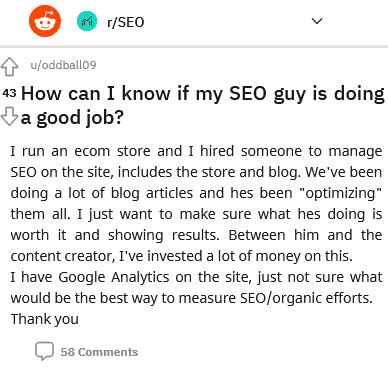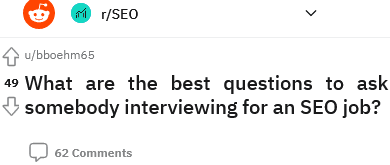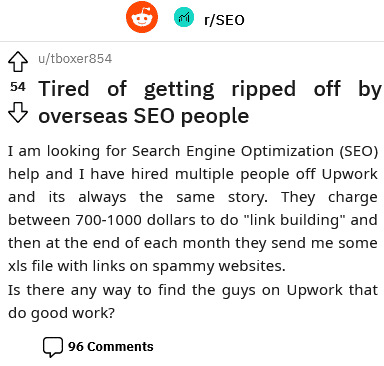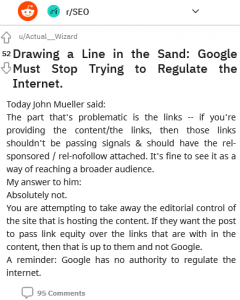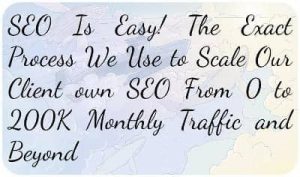How can I know if my SEO guy is doing a good job?
I run an ecom store and I hired someone to manage SEO on the site, includes the store and blog. We've been doing a lot of blog articles and hes been "optimizing" them all. I just want to make sure what hes doing is worth it and showing results. Between him and the content creator, I've invested a lot of money on this.
I have Google Analytics on the site, just not sure what would be the best way to measure SEO/organic efforts.
Thank you
58 💬🗨
📰👈
Does he give you reports? In an ideal world you would have a benchmark of what the site was achieving before taking on the content writer and Search Engine Optimization (SEO) then ongoing.
What are your Key Performance Indicators (KPI)s. Are you looking for increased exposure, more organic traffic, increase in rankings?
Your SEO should be showing you what he's doing and reporting on it ideally. Ofc this is budget dependent and a £50/mo SEO package isn't the same as someone spending thousands so I can't comment on the deliverables but tracking an increase in organic traffic and conversions would probably be a good place to start.
NHRADeuce
How long have you had Google Analytics installed? Did you enable ecommerce tracking?
If no, then why didn't the SEO guy do it as soon as he started working on the site? That would be a huge red flag for me.
When we on board a new SEO client the first thing we do is set up tracking for everything so we can show the client the value we bring. For ecommerce it's pretty simple, especially if the client has had Google Analytics (GA) with ecommerce tracking turned on. We can just look at revenue from organic sources year over year. If the number is higher by a good enough margin to cover the cost of Search Engine Optimization (SEO), we are doing our job well enough to keep paying. If not, we need to step it up or get fired.
Make sure you also check the assisted conversions report ;)
So many touchpoints through different channels made by the customers…
usctrojan415
Check your vitals. Revenue.
Ask a trusted source to check vitals like contact forms submitted, quality of the leads, pagespeed, spam score, domain authority, time on site, bounce rate, pages per session, geography/demographics of users etc.
Hey I'm trying to message you a question but can't, can you message me?
Buqly
Exactly this, revenue should be the most important metric at the end of the day
But I don't think time on site, bounce rate, pages per session are important metrics or an indication of a good or bad SEO, especially if not looked in the context of organic traffic alone
Not directly but if the addt'l traffic is staying on the site less, bouncing more, coming from areas you don't care about it could be a sign of shady SEO tactics, bad links, spam etc.
Buqly
Okay makes sense 👍
Psyrkus
Sorry what?
Those metrics are absolutely important for building a site that leads to said revenue.
Buqly
I mean ok to some extent
But if you tell the client look we increased the time on site, but revenue is at the same level he won't give a shit.
I guess your argument is with bounce rate of 100% nobody is buying anything as the checkout is probably not on the same page, and it's a fair point
On the other side, I land on the blog post that his SEO guy optimized, I spend 20 minutes reading it, I'm happy with the content, I'm warmed up, but I leave without visiting another page
My organic visit is a bounce, time on site will be reported as 0 seconds
Later that day, or a few days later, I'm back via Facebook/Google ad, then I browse a bit and buy
My point is yeah those metrics could be interesting to some extent, but can be misleading too
The_foodie_photog
I agree with everything you've said.
There piece that I'm not seeing mentioned here is whether or not there are defined campaigns within the Google Analytics (GA) profile, tied to specific calls to action on each page.
Tomdv2
You can use third party tools, such as Ahrefs to check your site's SEO health. Additionally, you can hire a third party to verify if anything useful is being done to your site.
Keep in mind, however, SEO work may take weeks, sometimes months even, to have any effect on your site, and even then it's still trial-and-error.
📰👈
seller_labs
For SEO, a metric would be website traffic by impressions in search, new users to the site, number of sessions, etc. Depending on the instructions given, there could be others (like increase conversion rate, decrease bounce rate, etc.). It isn't necessarily a fair metric to measure your search optimization employee/contractor by the amount of revenue since there are a multitude of factors that go into a purchase.
DoubleAgent10
I would say SEO is about getting the customer to your website and interacting with it. At that point it's the "hard sell" and depends on your user experience, product quality, pricing, ect.
An SEO can get someone to the website but if the pricing, shipping, product, or website design isn't right then the revenue won't grow in a linear way with traffic.
So if your traffic is up and your search engine results page ranking is higher than the Search Engine Optimization (SEO) is working. If you have had only a slight increase in revenue than other areas might need to be looked into. Just my 2 cents
This is the correct answer.
SEO is not a substitute for advertising or marketing. An SEO person's job is to get eyeballs on your site – that's it. You can tell if the SEO person is doing their job by how many more eyeballs visit your website. So many people here are trying to link sales to an SEO person's job.
arkitector
The simplest way to answer this question is to look at organic traffic growth since SEO began, and also to look at keyword positions.
Page speed is important too. Not only for keyword rankings, but for user experience. The faster your site loads, the better your conversion rates are likely to be.
Bounce rate, pages per session, time on page, etc…those metrics are relative to how you're analyzing the site. For example, you don't just look at your Organic Traffic segment and go "Oh geez, our bounce rate is 80%" That doesn't mean anything unless you find out where the majority of that traffic enters the site, and where they go from that landing page. Honestly, this is more in the User Experience (UX) realm and I wouldn't necessarily hold an SEO accountable for these metrics.
Obviously, if you're ranking well and getting more traffic, that should naturally lead to more sales. But if you're getting more traffic and not sales…that's a business issue. An SEO is not responsible for website design, pricing, discounts, etc. that can affect sales. Their job first and foremost is to drive more organic traffic to the site.
As someone who deals a lot with ecommerce, I think business owners often forget that they are still the ones who need to identify when to mark something down, stop selling an item, or increase inventory for certain products. Lots of variables at play here.
stillyoinkgasp
Revenue is one way, but it's too subjective for my liking. What you should be seeing:
• A clear trend of an increase in impressions, clicks, and average position (measured via Google Search Console)
• Obvious optimization of the "boring but basic" on-site SEO elements: meta titles, page/post/product titles, schema integration, descriptive anchor text used for interlinking, sitemap.xml added to Google Search Console (GSC), etc. All the simple stuff.
If you can measure revenue to organic traffic, that'd be the direct metric to measure Return of Investment (RoI). In the absence of that, you could use organic traffic data from Google Analytics and Google Search Console to identify patterns (pre/post SEO, how did the numbers look)/
askoshbetter
In Google Analytics Look at:
• Acquision
• > source / medium
• >> search for 'organic'
From here you can look at long term trend lines or month over month changes in organic traffic.
The ultra basic level of SEO reporting is for your SEO guy to state:
Here's the monthly organic traffic we were getting when we started. Here's what we're getting now. Here's the tactics I've done, and will do to continue to improve organic.
Google Search Console and Bing Web Master Tools are really good as well. As the business owner I recommend you admin those accounts, and grant access to your SEO guy, rather than vice versa.
📰👈
ichoosegreatness
Go to GSC (Google Search Console) and look at performance.
Your SEO is working is your traffic is on an upward trajectory. Period.
Also, you said that he's been optimizing your blog articles but didn't mention him optimizing your product/landing pages. If your SEO has been spending more time optimizing your blog, you might not see exponential growth in sales.
And on the topic of conversions, that's more of a User Experience (UX)/User Interface (UI) role, not Search Engine Optimization (SEO). The duty of an SEO is to get you traffic for the desired keyword(s). A good SEO will brainstorm and inform you of keywords they think will convert, but this responsibility weighs more on the employer/business owner. A better SEO will also wear the hat of UX/UI and change your sales funnel to increase organic sales.
TinkerLytics
I see many comments about revenue – and yes that can work eventually, but it takes time for this. I'm a sales-driven marketer but sales aren't always in the short view.
I would suggest that you make sure your goals are clear. Do you want more traffic or sales, both?
If it's traffic then you should be tracking the progression of key phrases you want to get. Impressions, clicks, avg position. This will help with short-term views. You can use Google search console and pipe it into data studio. Phrases will show lower avg position and higher impression share earliest then to click data.
With traffic, it's important to understand what traffic you're attracting. A blog post with information intent may or may not get you a sale and it could take a few touchpoints for this to happen. So blog posts traffic to a category page or product page shows pretty good interest intent. So Conversion Rate Optimization (CRO) should step in and take a look and guide that interest into a buy. Blog post to another blog post shows a potential but probably low intent. Might be worth an email capture and funnel through email streams.
A blog post to email sign up might take you a while to get a sale.
If it's sales traffic then it's important to also look at key phrases and make sure the phrases that are close to buyer intent are climbing. Again search console can help here. Analytics is pretty bad with giving you all the data for keyword intent but it's great to learn a bit about the traffic you're receiving. Setting up some reports to see how your organic traffic is interacting with your site go hand in hand with key phrase tracking.
scormegatron
In the end, the #1 Key Performance Indicator (KPI) for organic, is the same kpi you'd measure in paid search. For you it sounds like sales. If you get top rankings but your sales don't go up, that's a problem.
Often an effective path to travel is in running your paid search campaign first, so you can quickly identify what phrases actually convert into sales. Paid search gives you visibility in a matter of days, that could take months of organic work to achieve.
This way you don't accidentally spend budget on organic search efforts that don't actually convert into sales in the end.
boycottInstagram
Ask him to show you…
A good SEO should be delivering you clear data onReturn of Investment (RoI).
I.e. we focused on x keyword, and traffic to that page after x went to y and z conversions.
If anything, look at whether traffic to the pages they've been working on are improving traffic and sales.
We also have a lot of sites get us to review their SEO users work… Seen some horror shows. Sorry to anyone on here who's been fired because of it.
📰👈
AngryCustomerService
Using blogs and content for ecommerce is a long tactic. It can work, but don't expect immediate results. (It can happen, but don't expect it.)
Content for ecommerce contributes to the full funnel. So you need to track the full funnel and set Key Performance Indicators (KPI)s for the content. Is it brand awareness? Promoting a specific product? Is the blog being used for internal linking or do expect the content to do something? What do you expect THIS blog post to do?
Eventually it will turn into revenue, but content can take months to mature. With that said, I've also seen it have an immediate effect when the topic was created from content gap, share of voice, audience, and competitive research.
Do you have topic hubs or are you just slapping it on a blog? Has the SEO been able to look at the site architecture and work on any technical issues? Great content on a site with technical issues won't perform as well as it should.
Is the SEO involved with content ideation and able to structure it? Or is the person stuck with just optimizing the meta elements of whatever random topic someone thought would be great (for which there was no opportunity in the Search Engine Result Page (SERP), has no search volume, or doesn't match search intent)?
In short, is the SEO allowed to (knows how to?) act like a content SEO or are they basically a robot for meta elements? Makes a huge difference.
checkittoday
Honestly, if you've not taken time to align your marketing efforts with Key Performance Indicators (KPI)s and your business goals, then you've got some work to do. Not your SEO. You should be communicating or working with them to define and validate these efforts. Someone who practices SEO is going to work toward rankings, traffic and tying to them to conversions and many other metrics. As a business owner you should be leading them, not questioning whether not they're arbitrarily "doing a good job". Get in sync with them, align their efforts with metrics that matter to your business and add some value to them to make them measurable. Everyone wins.
__samudra_
Build an Organic keyword checklist which is best for your e-commerce. For eg: •Keywords with a good monthly searches. •Including the short tail and long tails.
Now, look up for where your site ranks wrt these keywords. If you're in the top 10 SERP it means your SEO guy is performing an incredible job. Or else, tell him to fix this. Oftentimes, ranking vs traffic varies which means your site may rank 1 (for a keyword) but the site at position 3 gets more traffic.
PriceFree1063
As you said, you're running an e-commerce site, you can ask your SEO person
• To send daily SEO reports
• You watch reports and see organic traffic
• Keep check no of users are increasing
• Ask them to send reports how many people clicked add to cart button
• Check site backlinks are keep improved
• Ask your SEO person to send all kind of acquisitions, behavior and conversation reports
• Compare daily, weekly and monthly reports
Since you are paying to him, so ask him to send more reports
Larsent
Look at organic traffic in analytics. Pages per visit? Time on site? Bounce rate? Use UTMs in his blog links. Get backlinks. Essential. Track essential keywords. I use Ahrefs . Use conversion tracking and select first click in attribution. Maximise rich results – be rich results ready. That includes image optimisation and video SEO and other meta tags.
What do you mean "get backlinks"? You can't just "get them".
Or are you talking about different kinds of backlinks?
OP asked how to tell if their SEO person is doing a good job. I listed some criteria including getting backlinks as it is recognized as a marker of authority for websites and is pretty much a requirement to get keywords to rank well. How to get backlinks? That's a big topic, there are many ways to do it, Google it and you'll get some ideas on how to do it
Kalashnikov77
Sorry for being rude. I know how to get backlinks and they're supposed to be out of your control and not guaranteed, even more so than traffic anyway.
Jakochu
If the end result of Search Engine Optimization (SEO) is to grow organic traffic, you need look at that first.
But organic traffic to your site is influenced primarily by 3 things; search volume of the keywords you rank for, the amount of keywords you rank for and your rank for those keywords. Keep in mind the two primary types of keywords: branded and unbranded queries.
Get your SEO guy to give you a report including YoY organic traffic, and a report outlining why fluctuations occurred (or didn't).
Eg "YoY organic traffic improved, this is because search volume for unbranded keywords you rank for including XYZ increased, which offset the drop in rank for branded keywords that appears to have occurred. We'd recommend your marketing team try a brand awareness campaign"
"YoY traffic decreased because search volume is generally down, even though rank for X keywords improved. A brand awareness campaign may help, we will continue to take steps to protect your rank for X keywords"
"YoY traffic has improved because you are ranking for more keywords because of the content strategy we implemented. In addition, this has improved search volumes for branded keywords, likely because you are beginning to be seen as an authority on your topic"
"YoY traffic improved because search volume of branded terms increased, likely because of the TVC campaign you ran"
"YoY traffic has increased because search volume of unbranded queries increased because of COVID. In addition, you also reached page 1 for several high volume keywords including XYZ."
Reporting on Search Engine Optimization (SEO) is notoriously difficult. There is no perfect super metric that can perfectly explain why traffic changed or didn't change. However, if you know what to look for you can do the sleuthing to get a near enough idea.
Good luck friend.
📰👈
Some Experts said they Update Posts on Google My Business GMB Weekly to Keep SEO Power
How Long Does an SEO Need to Work to Claim itself an Expert?
Should I go for an MBA or Marketing Degree to be an SEO Expert?
